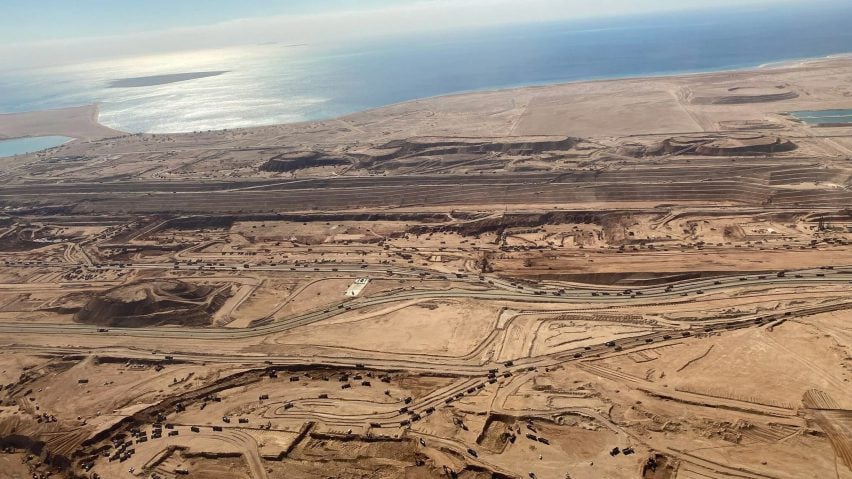Architecture studios involved in Neom should either campaign for the release of people imprisoned for protesting against the Saudi mega-project or walk away, says human rights campaigner Lina Alhathloul in this interview.
Speaking to Dezeen as part of a wider feature exploring whether architecture studios should reconsider their involvement in Neom, Alhathloul questioned the motives behind the multi-region development.
"It is a project that is definitely not a priority for the Saudi people, given the current state of existing cities in the country," ALQST head of monitoring and advocacy Alhathloul told Dezeen.
"It is steered by a one-man-rule policy that does not respect international standards and lacks any transparency," she continued. "In sum, it is built on the blood of Saudis, and migrant workers, for the benefit of western and international companies."
"Architecture firms working on Neom cannot pretend anymore"
Neom is by far the biggest and most controversial of 14 giga-projects being developed as part of crown prince Mohammad bin Salman's Vision 2030 plan to move Saudi Arabia's economy away from its reliance on oil.
The project has drawn criticism for reported human rights abuses, with ALQST reporting in 2022 that three men who were forcibly evicted from the Neom site had been sentenced to death. Last year the United Nations Human Rights Council "expressed alarm" over these imminent executions.
In an official response to the report, Saudi Arabia denied that human rights abuses had taken place and claimed the trio set to be executed were terrorists connected to Daesh and Al-Qaida.
A recent BBC interview with former Saudi intelligence officer Colonel Rabih Alenezi refocused international attention on the Neom human rights situation. Alenezi told the BBC that "lethal force" was authorised to remove those resisting relocation to make way for The Line mega city, which is being built as part of Neom.
"Architecture firms working on Neom cannot pretend anymore not to know that they are working on land on which the local inhabitants have been either killed, arrested, sentenced to death or forcibly displaced," said Alhathloul.
"They should urgently reflect upon their legal and moral responsibilities under the UN Guiding Principles on Business and Human Rights and relevant company commitments, and indeed reassess their involvement on the project entirely unless the adverse human rights impact can be addressed."
"It is not sustainable if developed against the will of the local people"
Neom is being developed on an area of land measuring around 10,200 square miles (26,500 square kilometres) in northwestern Saudi Arabia that is bounded by the Red Sea to the south and the Gulf of Aqaba to the west.
The land is the historic homeland of the Huwaitat tribe and it is estimated that around 20,000 tribe members are being relocated to accommodate the planned development. The BBC article highlighted three villages that had been demolished, and published before-and-after images of the village of Sharma showing the extent of the destruction.
Along with the reported death sentences, members of the Huwaitat tribe who have protested the evictions have been arrested by Saudi authorities. In 2020 tribe member Abdul Rahim al-Huwaiti was reportedly killed by Saudi security services after posting videos online aiming to draw attention to the evictions.
"The message to architecture studios working in Neom is that despite the huge PR machine surrounding the project, it is not sustainable if developed against the will of the local people, and without any checks, balances or transparent decision-making processes," said Alhathloul.
"You should either contribute to Neom being more respectful of its human rights and legal obligations, or your reputation will, indisputably, be affected, and linked to the project's mismanagement and accompanying abuses on the ground."
"Firms working on Neom have leverage"
Alhathloul believes that the architecture studios designing Neom – 23 of which have been identified so far – should be using their connections to the Neom developers and Saudi authorities to influence the human rights situation.
"Firms working on Neom have leverage and a communication line with the relevant Saudi authorities to inquire about the abuses and to push for the release of all those unjustly detained," she said.
"Architecture firms should advocate for the release of everyone unjustly imprisoned in connection to Neom, make it an essential condition of their involvement, and be prepared to cease their engagement if these calls are not met."
Saudi human rights activist Alhathloul campaigns to draw greater attention to the Saudi justice system, including the release of her sister, who lives under a travel ban.
Alhathloul's sister was arrested multiple times for defying the ban on women driving in Saudi Arabia before being kidnapped in the United Arab Emirates in 2018 and forcibly deported to Saudi Arabia where she was charged with "attempting to destabilise the kingdom".
"The message is clear that anyone expressing skepticism about the crown prince's rights agenda faces time in jail," said Middle East director at Human Rights Watch Sarah Leah Whitson at the time.
Alhathloul warned architecture studios to be wary of misinformation being spread by the Saudi authorities, as there is little independent reporting in the country.
"Those still involved or considering involvement must use the leverage at their disposal and conduct due diligence to avoid becoming complicit," she said.
"Given that Saudi Arabia does not have any independent human rights monitoring, and that independent NGOs have not been allowed in the country since 2017, they should engage with organisations like ALQST who are knowledgeable on the matter."

